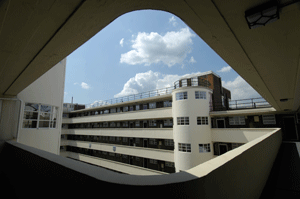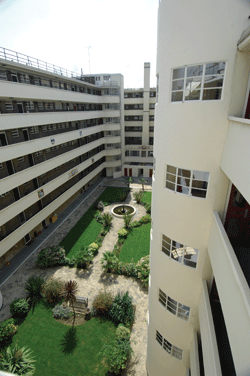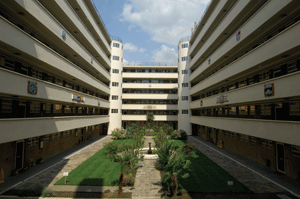
Restoration Program (continued)
 |
| Click on Image to Enlarge |
The refurbishment project is valued at approximately £5.5m, of which £1.8m is accounted for by the windows replacement work undertaken by Crittall. There were of course additional building costs, including scaffolding. Some 1500 units (windows, doors and privacy screens) were installed in the 211 flats. The window replacement began on 24th November 2008 and finished on 30th June 2009, exactly on schedule. Unlike other similar projects, it was so well estimated and managed that it came in on budget.
Festalfine and Hunter Price are in no doubt that the reason underlying the smooth running of the project was pre-planning, which took place between April and November 2008. Crittall clearly set out its intention that the fenestration for each individual flat should be changed in one day and planned accordingly. During the entire contract period only three days were lost due to an exceptionally heavy snowfall early in 2009, but this did not affect the programmed completion date.
Teamwork
 |
| Click on Image to Enlarge |
At the outset a close-knit team involving all the principle partners (Festalfine, Crittal, Hunter Price) was set up to manage and guide the project. This approach was underpinned by the acceptance of Hunter Price’s suggestion that a construction manager should be employed directly to oversee the project. Festalfine acknowledged that as a small management company dealing with such a large and complex a project, found itself on a steep learning curve. They are in no doubt that bringing together a compact and balanced project team coupled with a strong contract management team were the keys to success.
By opting for the construction manager approach the project obviated the need for a main contractor. Individual contracts were established with each of the principle firms involved, including Crittall, and a fortnightly payments regime was instituted.
Conflict free and flexible
All trade contracts were held by the client, Festalfine, which gave it direct control of the project through the construction manager. Regular meetings resolved issues quickly, and those involved say this had the effect of taking potential conflicts out of the system. The construction management approach proved flexible and led to a spirit of co-operation. The absence of a main contractor with all the attendant overheads is estimated to have reduced the cost of the project by some £800,000. As Festalfine is a not-for-profit organisation acting in the interests of the leaseholders, this was a further bonus.
Satisfied customers
 |
| Click on Image to Enlarge |
While all those involved in the running of the project agree that it was handled successfully, it is the judgement of the residents of Lichfield Court that provides the final verdict. Residents were given a date on which their windows would be replaced, six months ahead, which proved invaluable to those who had to make arrangements. They were also given a clear indication of how long different works would take to complete in the case of windows each flat should be finished within a day on average. The construction manager established a ‘snagging and complaints’ procedure at the outset, with the intention that any remedial work needed, was undertaken within 48 hours, whilst the scaffolding (a high cost element) was still in place.
All the work was regularly monitored and Festalfine supplied leaseholders with regular bulletins about progress. As the work continued a steady stream of residents expressed their thanks to the management company about the manner in which the work was carried out and the finished result.

